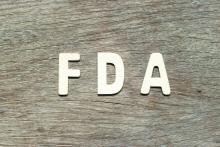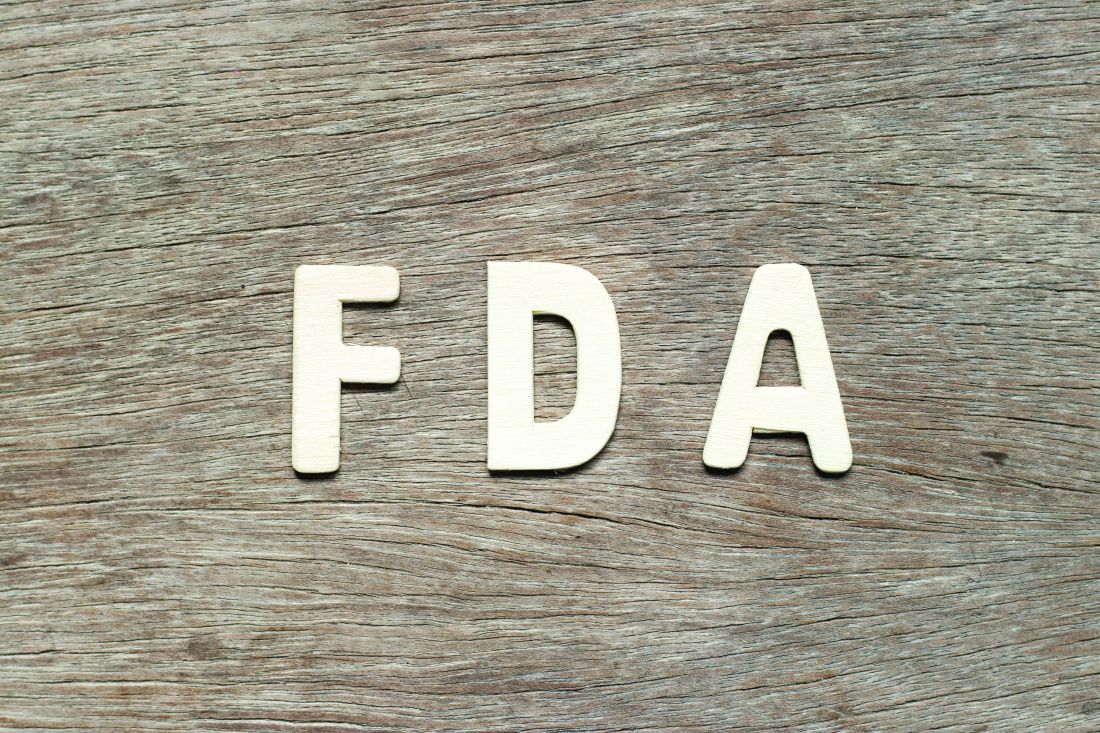User login
The Food and Drug Administration has issued an alert to health care providers and patients about voluntary recalls of ranitidine (Zantac) from three separate companies because of the potential of N-nitrosodimethylamine (NDMA) in the medicine.
According to the FDA alert, Perrigo is recalling over-the-counter ranitidine tablets of all sizes, Novitium Pharma is recalling all unexpired quantities and lots of ranitidine hydrochloride capsules, and Lannett is recalling all unexpired lots of prescription ranitidine syrup (ranitidine oral solution (15 mg/mL).
Patients who are using over-the-counter ranitidine should consider switching to an alternative, such as famotidine, cimetidine, esomeprazole, lansoprazole, and omeprazole, the FDA noted. None of these medications have shown evidence of containing NDMA.
The alert is the fifth update on ranitidine since the initial FDA announcement that NDMA had been found in ranitidine on Sept. 13, 2019.
Lillian M. Beard, MD, who has a private pediatrics practice in Silver Spring, Md., commented, “We have been grappling with concerns about our patients currently taking ranitidine and how we might address the issue. In our practice, we have had very few questions so far. We anticipate that as their awareness is heightened, our parents will seek our advice. In querying our GI colleagues for recommendations on managing the conversations with parents about their concerns about possible carcinogen contamination in ranitidine samples, our practice group was advised that the FDA is not currently recommending that patients on the medication need to immediately stop, pending further investigation.”*
Dr. Beard, also an associate clinical professor of pediatrics at George Washington University in Washington, continued, “Our GI colleagues at Children’s National currently are not starting patients on ranitidine, but choosing a different H2 blocker, famotidine (Pepsid). They are not trying to reach out to patients on ranitidine to ‘switch,’ but when parents call in to refill prescriptions or for management advice, they are switching them to famotidine. Until further notification and or clarification, I will do the same.”
*Updated 11/5/2019
The Food and Drug Administration has issued an alert to health care providers and patients about voluntary recalls of ranitidine (Zantac) from three separate companies because of the potential of N-nitrosodimethylamine (NDMA) in the medicine.
According to the FDA alert, Perrigo is recalling over-the-counter ranitidine tablets of all sizes, Novitium Pharma is recalling all unexpired quantities and lots of ranitidine hydrochloride capsules, and Lannett is recalling all unexpired lots of prescription ranitidine syrup (ranitidine oral solution (15 mg/mL).
Patients who are using over-the-counter ranitidine should consider switching to an alternative, such as famotidine, cimetidine, esomeprazole, lansoprazole, and omeprazole, the FDA noted. None of these medications have shown evidence of containing NDMA.
The alert is the fifth update on ranitidine since the initial FDA announcement that NDMA had been found in ranitidine on Sept. 13, 2019.
Lillian M. Beard, MD, who has a private pediatrics practice in Silver Spring, Md., commented, “We have been grappling with concerns about our patients currently taking ranitidine and how we might address the issue. In our practice, we have had very few questions so far. We anticipate that as their awareness is heightened, our parents will seek our advice. In querying our GI colleagues for recommendations on managing the conversations with parents about their concerns about possible carcinogen contamination in ranitidine samples, our practice group was advised that the FDA is not currently recommending that patients on the medication need to immediately stop, pending further investigation.”*
Dr. Beard, also an associate clinical professor of pediatrics at George Washington University in Washington, continued, “Our GI colleagues at Children’s National currently are not starting patients on ranitidine, but choosing a different H2 blocker, famotidine (Pepsid). They are not trying to reach out to patients on ranitidine to ‘switch,’ but when parents call in to refill prescriptions or for management advice, they are switching them to famotidine. Until further notification and or clarification, I will do the same.”
*Updated 11/5/2019
The Food and Drug Administration has issued an alert to health care providers and patients about voluntary recalls of ranitidine (Zantac) from three separate companies because of the potential of N-nitrosodimethylamine (NDMA) in the medicine.
According to the FDA alert, Perrigo is recalling over-the-counter ranitidine tablets of all sizes, Novitium Pharma is recalling all unexpired quantities and lots of ranitidine hydrochloride capsules, and Lannett is recalling all unexpired lots of prescription ranitidine syrup (ranitidine oral solution (15 mg/mL).
Patients who are using over-the-counter ranitidine should consider switching to an alternative, such as famotidine, cimetidine, esomeprazole, lansoprazole, and omeprazole, the FDA noted. None of these medications have shown evidence of containing NDMA.
The alert is the fifth update on ranitidine since the initial FDA announcement that NDMA had been found in ranitidine on Sept. 13, 2019.
Lillian M. Beard, MD, who has a private pediatrics practice in Silver Spring, Md., commented, “We have been grappling with concerns about our patients currently taking ranitidine and how we might address the issue. In our practice, we have had very few questions so far. We anticipate that as their awareness is heightened, our parents will seek our advice. In querying our GI colleagues for recommendations on managing the conversations with parents about their concerns about possible carcinogen contamination in ranitidine samples, our practice group was advised that the FDA is not currently recommending that patients on the medication need to immediately stop, pending further investigation.”*
Dr. Beard, also an associate clinical professor of pediatrics at George Washington University in Washington, continued, “Our GI colleagues at Children’s National currently are not starting patients on ranitidine, but choosing a different H2 blocker, famotidine (Pepsid). They are not trying to reach out to patients on ranitidine to ‘switch,’ but when parents call in to refill prescriptions or for management advice, they are switching them to famotidine. Until further notification and or clarification, I will do the same.”
*Updated 11/5/2019

